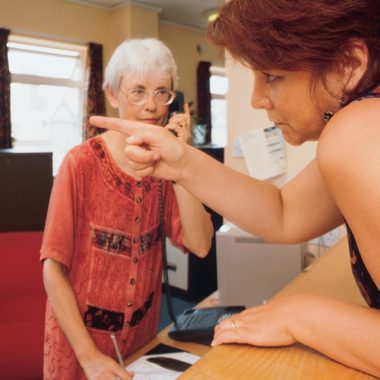A patient asks for an appointment, but when told which GP they are seeing, they say they won’t accept a ‘non-white’ GP. What should we do at the practice?

Dr Pipin Singh: Consider if it warrants action against the patient
It is important to have a protocol for situations like this. A receptionist facing this should probably provide the patient with an alternative doctor as they are likely to be busy. However, they should also refer the situation to the practice manager.
It would be useful for one of the doctors or the practice manager to explore why the patient does not wish to see that particular doctor. It is important to remain non-judgmental. You may be able to delicately challenge any ideas the patient has and change their views.
If this proves unsuccessful, you must decide how serious the comments have been or investigate whether this has happened before. If it has, this may warrant immediate removal from your list. Send a letter explaining the specific behaviour and an explanation that you have a zero tolerance attitude, citing the Race Relations Act to support this.
If there have been no prior issues then a written warning would be acceptable. This would explain that the incident has made the GPs and staff very uncomfortable. It would also be worth signposting the patient to NHS England statements from the Equality and Diversity Council, stating ‘employees from black and minority ethnic backgrounds have equal access to receive fair treatment in the workplace’, and stating that if this sort of behaviour is displayed again it will lead to immediate removal.
Dr Pipin Singh is a GP in Wallsend, Tyne and Wear

Dr Trevor Thompson: Don’t jump to conclusions
Let’s assume the initial call was taken by a receptionist and passed to me for action. Despite initial annoyance, it’s important that I park my reactivity and find out what is going on. The ethical tension here sits between my desire to respect patient choice and the wrongness of making that choice on grounds of race.
After a quick look at the caller’s notes – to check if it is a recurrent problem and whether they might have serious mental illness – I’d call the patient and explore. Perhaps they don’t want to see a certain GP because of past issues. If so, I’m more at ease because the race angle is probably incidental – a badly played attempt at identification.
In the recent past the NHS has benefited from the services of non-UK trained doctors from Asia and Africa, some of whom have been perceived to have imperfect English, strong accents and cultural distance. If I picked up this perspective I’d explain all our doctors are perfect English speakers. This is the flipside of the many patients who seek out my partner who is fluent in Kurdish. People yearn for that cultural recognition. Conversely the caller might themselves be from an ethnic minority and worry about being judged.
If the caller pursued purely race-based ‘reasoning’ I would remind them that the backgrounds of all doctors are published on the practice website and explain that such requests are disrespectful and possibly outside the law (Equality Act 2010). If they softened, I would actively encourage them into a consulting situation where they might learn that skill and compassion are colour blind.
Dr Trevor Thompson is a GP in Bristol and reader in healthcare education, University of Bristol

Dr Mohammed Saqib Anwar: Seek help from family members
While the most obvious response may be to refuse such a request, it is important to consider the issues fully. Respect for patient autonomy is one of the most important principles of medical ethics. The GMC in Good Medical Practice states that: ‘You must respect a competent patient’s decision to refuse an investigation or treatment, even if you think their decision is wrong or irrational’. But does this include refusing an unwanted doctor? Here are some points to consider.
What is the patient’s medical condition? In an emergency with a patient whose condition is unstable, the refused doctor could quite properly stabilise the patient. What are the reasons for the request?
Patients may refuse a particular doctor because of bad experiences. The patient may have had a negative personal experience with people of a particular race or ethnic group (such as a veteran with post-traumatic stress disorder who refuses treatment from a clinician of the same ethnic background as former enemy soldiers, or a woman who has been exploited by males of a particular race). You need to understand why they don’t want to see that GP rather than simply assume is down to racism.
What are the options for responding to the request? For example, could you use family members to help patients accept the doctor? Are any other doctors available? Would it be appropriate for them to wait to see someone else?
I think it is helpful for doctors to consider these factors and possibly seek advice from their medical defence organisation before deciding how to proceed.
If the situation and circumstances allow I think the doctor being rejected could explore these issues themselves, but failing that I would delegate the job to the practice manager, given the sensitive nature. It may be that further discussion is required or the request might be accommodated given the clinical situation.
Dr Mohammed Saqib Anwar is medical secretary of Leicester, Leicestershire and Rutland LMC and a GP in Oadby
Pulse October survey
Take our July 2025 survey to potentially win £1.000 worth of tokens














